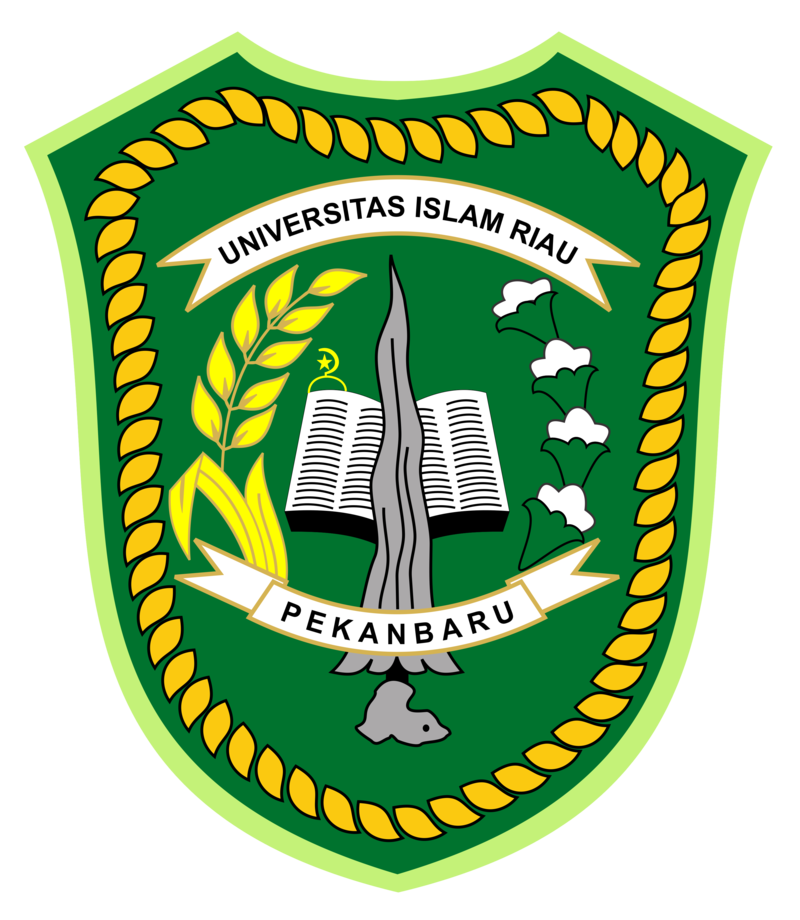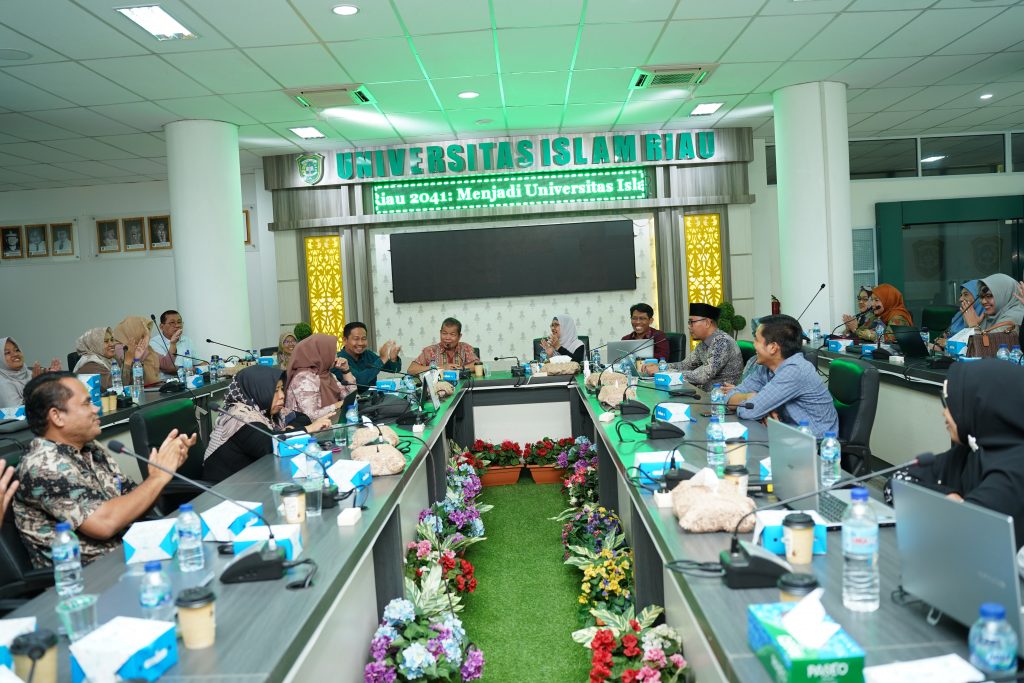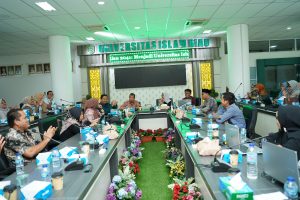In his speech, the Head of LPM Riau Islamic University, Dr. Asrol stated that the implementation of this auditor refresher is a must because Riau Islamic University has a new vision of “becoming a world-class Islamic university based on faith and piety 2041”. “In this vision there has been a change where it has reached the world region, previously it was in the Southeast Asia region,” he added.
The activity organized by LPM Universitas Islam Riau is an important agenda in developing the quality and competitiveness of UIR in the global world. Dr. Asrol said that currently Riau Islamic University will carry out a summative evaluation, and it must begin with an Internal Quality Audit (AMI). This auditor refresher lasts for two days, from August 14-15, 2023, the Renstra of Riau Islamic University will be presented because in it there are achievements and programs that must be implemented. “Today’s internal quality audit auditor refresher was attended by 46 lecturers from all faculties of Riau Islamic University (9 Faculties and Postgraduate Program), who later if they graduate will conduct audits to units within Riau Islamic University,” said Dr. Asrol.
In his final remarks, Dr. Asrol expressed his highest gratitude for the presence of all parties in developing the quality and competitiveness of Riau Islamic University.
Meanwhile, the vice rector for academic affairs at Riau Islamic University, Dr. Syafhendri, revealed that this activity is very urgent not only for auditors to add insight and experience in auditing properly, this activity is carried out to develop this institution in the future. This AMI must be maintained and maintained for all lines. This presentation must be enjoyed properly. “The audit stage is very important because it is related to external audits. All of us must jointly participate in improving the management lines in their respective places,” said Syafhendri.
“Hopefully all of us continue to follow this activity carefully. Follow this program well and thoroughly. We really appreciate the organization of the internal quality auditor refresher. We have a lot to develop, especially in developing and succeeding the new vision of UIR,” he said seriously. “It takes firmness and sincerity of time in participating in the refresher of internal quality auditors. Congratulations on attending the training and refresher of auditors for the 2022-2023 period, “continued this energetic vice rector.
By saying “basmalah”, the auditor refresher on internal quality audits for the 2023-2024 period which took place from August 14-15, 2023 was officially opened by the Vice Rector for Academic Affairs of Riau Islamic University.
Developing Riau Islamic University to Achieve International Recognition
After the opening, the next activity was the presentation of material by Dr. Slamet – a lecturer from Muhammadiyah Yogyakarta University – about the development of Riau Islamic University in achieving international recognition. In his presentation, he revealed the development framework of Riau Islamic University by looking at the 2045 world megatrend and sustainable development goals (SDGs). Both world trends must be juxtaposed with the vision to develop the campus of Riau Islamic University to achieve international recognition at this time and in the future.
“These two trends must be accommodated in developing UIR’s vision in the future. This is a form of our efforts in achieving international recognition. In developing world-class UIR, we cannot be separated from our own vision. Development must have a strong foundation and have standards that adopt SNPT and additional campuses themselves, “said Slamet.
On the other hand, in Slamet’s presentation, university development must look at inputs (students – domestic and foreign; lecturers – domestic and foreign). Students are very important to develop in order to achieve international recognition.
Not only that, in the process of campus development; where teaching, research, governance, and cooperation, become an absolute thing to develop. Teaching must be based on outcome-based education (OBE). It is necessary to pay attention to the percentage that uses PjBL, PBL, and CBL. In the cooperation section there is recognition of academic reputation. The implementation of the MoU must be developed. What must be avoided is that there are many MoUs but there is no activity.
Important things to note in the output area are graduates, student achievement, and research output. According to Slamet, the big issue about graduates is related to the percentage of success of the study program. In the outcome aspect; career of graduates, community service, citations, and innovation are crucial for universities to develop.
“In the development, universities must pay attention to competitors or campus competitors, and also pay attention to stakeholders,” said Slamet.
If these things are developed, recognition will emerge. Recognition is done by accreditation, certification, ranking, or clustering. To measure the recognition, it is done with two things, namely SPMI and SPME. If this is done, it will create a reputation. “If we want to excel, then the talk is SPME, and SPME comes from SPMI. Therefore, UIR must have a strong quality assurance system. It is necessary to strengthen SPMI in order to get recognition. And this is what guarantees is SPME, “said Slamet.
On the other hand, Slamet emphasized that for university development, indicators of academic reputation development are needed. The main indicator of academic reputation is; it is done very intensely to develop the campus. This must be strengthened by cooperation. Publications must be developed with various countries in the world. Other indicators are employer reputation; paper and citation (Scopus indexed); international faculty & students (fulltime & exchange); international network; and SDGs.
Meanwhile, the main development strategies that must be carried out by the campus are; strong leadership at all levels; performance-based policies; program and financial priorities; adoption of international indicators to university performance indicators; consistent planning and quality assurance at all levels; and strengthening the performance commitment of the community and staff.
Becoming a Professional Auditor
Being an auditor requires requirements and a binding code of ethics in conducting audits on units. Megawati Hayati explained this on the second day, Tuesday (15/82023) at the 2nd floor rectorate building of Riau Islamic University. Megawati explained various procedures for recruiting assessors; to become a good assessor, an auditor selection is held, then has a certificate to the ability to carry out audits professionally.
An auditor has qualifications; has a master’s degree; has attended auditor training conducted by LPM; careful and thorough; honest and open; has good and effective communication skills orally and in writing; has problem solving skills; is able to be independent and free from the influence of subjectivity in conducting audits.
Auditors must be able to conceptualize or skills in solving problems; both in improvement to formulate strategies. Auditors must be able to formulate strategies in overcoming problems, complete with good indicators. “Make sure the auditor does not audit his own unit, so as to avoid subjectivity,” said Megawati.
The important thing that auditors must have is a code of ethics. Auditors have a code of ethics in carrying out their duties. There are several codes of ethics that must be owned, namely; coordinating between auditors, agreeing on the division of tasks, agreeing on things that must be conveyed, preparing auditor comments, and listening to clarification, preparing questions / things that need to be confirmed, arriving on time, using audit forms, being constructive, and others. In this regard, auditors must review the completeness of activity documents, explore and analyze relevant evidence in order to conclude.
In auditing, the editor must confirm supporting data (evidence), agree on achievements and findings, ask and understand what are the obstacles, improvements and RTL, ensure that the improvement obstacles, and RTL have been completed. check the RTL in the last year, whether it has been done, and help auditees find obstacles and root causes and formulate achievement strategies.
Auditor behavior during field assessment (AL) must be considered and owned by all auditors so that the work done is useful and valuable. These behaviors are; don’t be an integrator, stay objective and friendly, avoid trapping and accusing, don’t waste time, don’t compare with other work units / yourself, and don’t be wordy or confusing. “Help the unit find achievement strategies,” Megawati said.
On another aspect, Megawati emphasized that verification of the root cause of the problem has been thoroughly identified; for example, lecturers lack enthusiasm. Verify that the corrective actions taken are good and effective. Another thing is to verify the related personal. And, auditors see documentation of the actions that have been taken. “IKS reference documents are things that must be understood and known by auditors in carrying out audits at units,” Megawati emphasized while giving examples.
The most important thing for auditors to know and have is how to audit properly. According to Megawati, an auditor must understand the strategic performance indicators (IKS) as an achievement to be achieved. Understand the institution/unit; the auditor explains the achievements achieved during the audit. Digging up obstacles (factors inhibiting the achievement of IKS); auditors formulate obstacles, for example why lecturers are not enthusiastic about writing Scopus or WoS indexed journals. Auditor understands supporting factors (supporting factors for IKS achievement); identify supporting factors in the audited unit, for example what are the supporting factors for lecturers not being enthusiastic about writing in Scopus or WoS indexed journals. Auditors understand improvements (short-term corrective actions). Auditors must also be able to formulate a follow-up plan (RTL) (corrective actions for the next period). The auditor writes the PIC / completion date; where the auditor writes who is responsible and the completion date. Furthermore, Megawati outlined the AMI reporting systematics that guide all auditors. The systematics can be in the form of: introduction (background, objectives and scope of the audit); audit implementation (technical implementation); audit findings can be: per standard, category:
1. Achievement above 50%,
2. No achievement,
3. Deviate,
4. Exceed the standard; and recommendations.
The next session continued with a simulation of being an auditee, the lecturers identified problems in their respective units. Furthermore, the training participants simulated being auditors and conducted audits of the units that had been determined. The next stage was the presentation of the audit results of the training participants in order starting from the first group to the sixth group.
During the presentation of the audit simulation results, which was guided by Azmansyah, various questions and views emerged about the auditor’s findings. There were several different understandings in finding audit results. For example, the understanding of work unit descriptions is still biased. Actually, the description of the work unit is the facts that occur in the unit, describing the achievements obtained in the unit in the form of facts that occur. Constructing the obstacle section is that the root of the problem must be found, so that improvements and RTL are appropriate. Formulating RTL is that there may still be the same as improvements but can be done for the following year. The formulation of RTL is very important so that these problems do not occur again in the future. In the target section; is a strategic thing, from the leadership (LPM) with calculations achieved. There are targets set by work units that are calculated realistically.
Various questions about how to audit properly and correctly emerged from the lecturers during the presentation of the audit simulation results. In the process of simulating audit results, how to determine and identify findings in the field emerged. For example, how to identify and discuss work unit descriptions, constraints, supporting factors, RTL, and targets.
Recommendation
The two-day activity was closed with a description and remarks delivered by Dr. Asrol as the Head of the Riau Islamic University Quality Assurance Agency. Every accreditation is matched with the Strategic Plan and the results of the internal quality audit. We must make improvements for the coming year. We must be able to be firm and exceed the target because there is SPME faced by all study programs. The implementation of the PPEPP cycle, one of which is the implementation of quality and reliable internal quality audits, will develop Riau Islamic University with quality and competitiveness.
Asrol thanked the speakers and auditors who remained faithful in following the refresher. Thanks were also expressed to senior auditors who had the pleasure of participating in the auditor refresher.
The next activity is equalizing perceptions with auditees and socializing the AMI system. Filling in the internal quality audit report must be in accordance with the template standardized by LPM UIR. The schedule of perception gathering and audit followed in accordance with the stages designed by LPM UIR. By saying “alhamdulillah rabbil ‘alamin” the event was officially closed by Dr. Asrol. Hopefully, with the implementation of the PPEPP cycle, one of which is evaluation with the implementation of quality and reliable internal quality audits, Riau Islamic University will have quality and competitiveness. Wallahu a’lam. [Syahraini Tambak].








